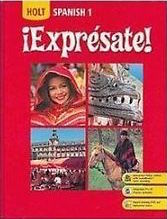
Expresate!: Spanish 1
1st Edition
ISBN: 9780030452048
Textbook solutions
All Solutions
Page 53: 18
Exercise 1
Step 1
1 of 3
In this section you are asked to fill in the blanks with the logical questions, based on the responses given to them. The first response reads “My name is Gisela Ríos Perales”.
Step 2
2 of 3
Given the response, it seems the only logical question would be “what is your name?” Since the question is being asked to another kid, we don’t need to worry about using the formal form of the question. Don’t forget the accent on the first “o” of *còmo* or the beginning and ending question marks.
Result
3 of 3
¿Cómo te llamas?
Exercise 2
Step 1
1 of 3
In this section you are asked to fill in the blanks with the logical questions, based on the responses given to them. The second response reads “I am from Burgos, Spain”.
Step 2
2 of 3
Given the response, it seems fairly obvious that the question is “where are you from?”. If you look back on page 52 you will find an example of how to ask this question. This question is being asked in the *tù* form so we will use *eres* as the form of *ser*.
Result
3 of 3
¿De dónde eres?
Exercise 3
Step 1
1 of 4
In this section you are asked to fill in the blanks with the logical questions, based on the responses given to them. The third response reads “no, I’m not timid. I am extroverted”.
Step 2
2 of 4
Gisela specifically denied being timid, meaning she was probably asked if she was timid. Then she goes on to reveal that she is, on the contrary, extroverted. She is responding with the *yo* form of *ser*, because we are going to ask her the question using the *tú* form, which is *eres*.
Step 3
3 of 4
We also have to remember that since Gisela is a girl, we will use the feminine form of timid, which is *tímida*.
Result
4 of 4
¿Eres tímida?
Exercise 4
Step 1
1 of 4
In this section you are asked to fill in the blanks with the logical questions, based on the responses given to them. The fourth response reads “they are intelligent, friendly and athletic”.
Step 2
2 of 4
While there are quite a few people this response could be referring to, using some context clues we can figure it out. Gisela is a student, so she could be talking about her classmates, although athletic is a strange thing to describe your classmates as being. Her friends, however, fit the bill perfectly. This means our question is “What are your friends like?”
Step 3
3 of 4
Since the adjectives she is using to describe her friends are written in the masculine, plural form (the correct form for a group of boys OR a group of mixed gender), we know that we will use the same form for “your friends” (*tus amigos*). This will also make *son* the correct form of *ser*. Recall from the previous exercise that *cómo* is the question word we will use here.
Result
4 of 4
¿Cómo son tus amigos?
Exercise 5
Step 1
1 of 3
In this section you are asked to fill in the blanks with the logical questions, based on the responses given to them. The fifth response reads “I am fourteen years old”.
Step 2
2 of 3
This is one of those really obvious responses, since the only question that makes any logical sense here is “how old are you?”. You’ll remember learning this question on page 47 in the green vocabulary box. We use the question word *cuántos* here, with an accent on the “a”. Don’t forget the beginning and ending accents that are necessary to indicate a question in Spanish.
Result
3 of 3
¿Cuántos años tienes?
Exercise 6
Step 1
1 of 3
In this section you are asked to fill in the blanks with the logical questions, based on the responses given to them. The final response reads “my birthday is the 15th of March”.
Step 2
2 of 3
Given Gisela’s response, we can be pretty sure the interviewer is asking her when her birthday is. This is another question we learned on page 47, and again on page 52, when learning vocabulary regarding birthdays and question formation. You should note that, like all question words, *cuándo* takes an accent, in this case above the “a”.
Result
3 of 3
¿Cuándo es tu cumpleaños?
unlock

